IL License Number: 104.017181
IL License Number: 104.017181
Replacing a roof is a significant investment. Nationally, new roof installations average around $10,000 to $11,000, but can range from as low as ~$6,000 for basic shingle roofs to well over $30,000 (even up to $50,000) for premium materials like slate, tile, or copper. Most Illinois homeowners spend $5,700 to $16,000 for a typical roof replacement, which equates to roughly $3 to $6 per square foot installed.
The exact price of your new roof depends on a mix of considerations – including the roof’s size, complexity, chosen materials, and local labor rates – all of which we’ll explore in detail below.

Roofing materials range from inexpensive composite shingles to premium natural slate. Below, we detail the common types: asphalt shingles, cedar wood shakes, metal roofing, clay/concrete tiles, and slate. Typical costs, pros/cons, and lifespan are included for each. All costs include a full tear-off and professional replacement.
Asphalt shingles are the most popular and budget-friendly roofing material, chosen for about 70% of Illinois homes. They come in two main varieties: 3-tab shingles and architectural (dimensional) shingles. Basic 3- tab asphalt shingles cost roughly $3 – $5 per square foot installed. These 3-tab shingles are flat and uniform in appearance, and typically last around 15–20 years.
Architectural shingles, which are thicker and more durable, run about $4 – $6 per square foot. Architectural shingles (also called dimensional or laminate shingles) have a textured, layered look and often come with 30-year warranties.
Asphalt shingles are relatively light-weight, easy to install, and available in many colors. However, they are less durable than costlier materials – extreme heat, hail, or high winds can shorten their lifespan. Still, for most homeowners, asphalt shingles offer an excellent balance of affordability and decent longevity.
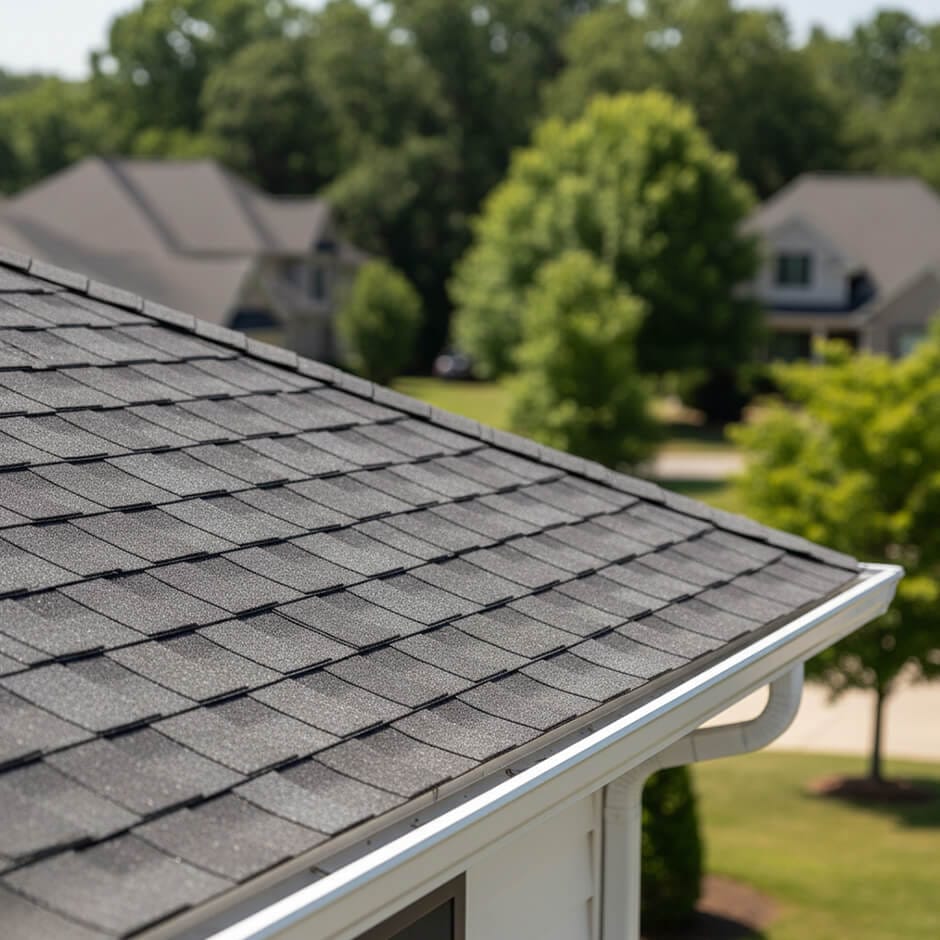
| Material | Cost per sq. ft. (installed) | Small House (1,000–1,500 sq. ft.) | Average-Sized House (2,000–2,500 sq. ft.) | Large House (3,000–5,000 sq. ft.) | Lifespan (years) |
|---|---|---|---|---|---|
| Asphalt Shingles (3-tab) | $3 – $5 | $3,000 – $7,500 | $6,000 – $12,500 | $9,000 – $25,000 | 15 – 20 |
| Asphalt Shingles (architectural) | $4 – $6 | $4,000 – $7,500 | $8,000 – $15,000 | $12,000 – $30,000 | 30 |
If you love the warmth of a natural wood roof, you’ve got two great directions: wood shingles for a clean, tailored look, and cedar shakes for thicker, hand-split texture with those dramatic shadow lines. Cedar is the most commonly used wood, as it’s naturally rot-resistant and made for classic curb appeal on steeper roofs and cottage or historic homes. The style you choose changes more than the vibe: it affects installation, ventilation, and how the roof weathers in your climate. Read on for a clear, no-nonsense look at real-world costs, expected lifespan, the maintenance to budget for, and the fire code/insurance notes to keep in mind—so you can pick the right wood roof with confidence.
Prized for its natural rot-resistant oils, cedar is the most common wood species used. A new cedar shake roof costs roughly $7 – $15 per square foot installed. The cost can vary based on the grade of cedar (premium clear-grade vs. common grade) and the shake thickness; thicker “heavy” shakes or premium grades cost more (but also last longer). Cedar shingles (which are thinner and machine-cut) might be slightly cheaper (on the order of $5 – $12 per square foot) but are less commonly used for full roofs compared to shakes.
Wood roofs typically last around 25 to 30 years with proper maintenance , but they do require upkeep: periodic cleaning, treatments for moss/mildew in damp climates, and ensuring they are adequately ventilated to dry out. In some areas, wood roofs may be restricted or require flame-resistant treatment due to fire codes (wood is a Class C fire-rated material unless treated). Also, insurance premiums might be higher for wood roofs in fire-prone regions. Installation is labor-intensive, which contributes to the higher cost.
There are composite (synthetic) shakes on the market made of rubber or plastic that mimic cedar looks; these cost about the same or slightly more than real wood (around $6–$18 per sq ft) but offer longer life and better fire resistance. Overall, a cedar shake roof provides a distinct, classic look, but homeowners should budget for both the higher upfront cost and ongoing maintenance.
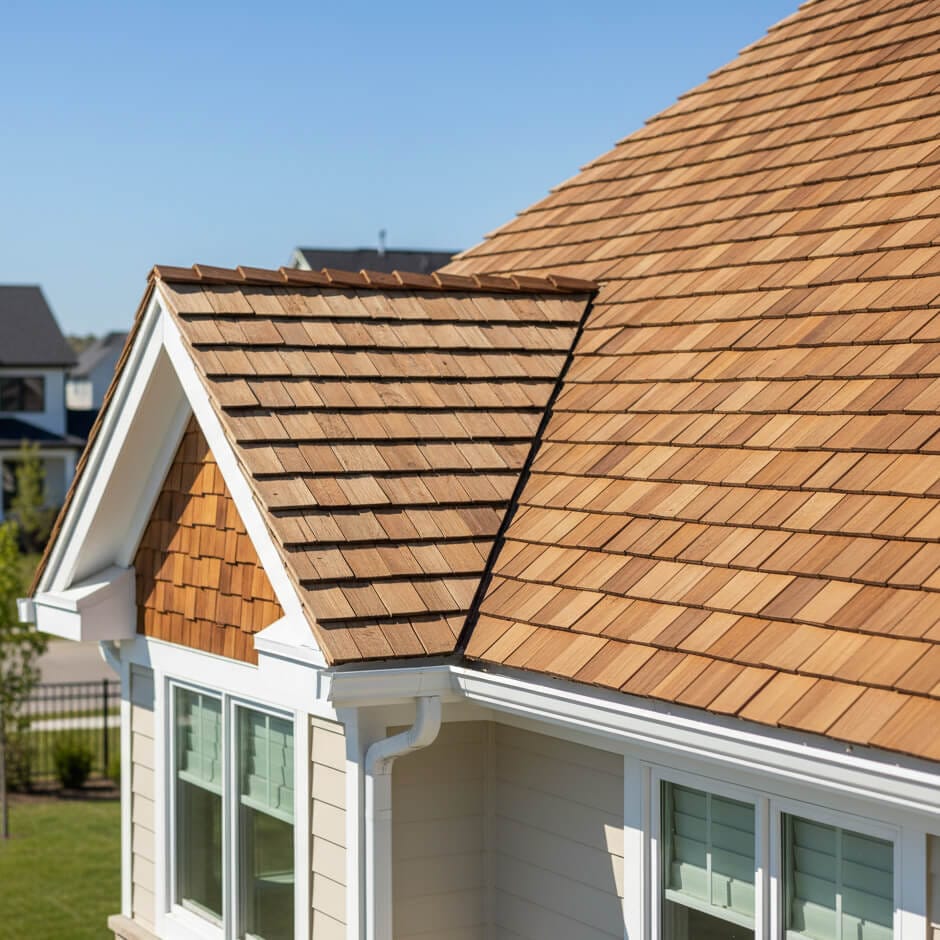
| Material | Cost per sq. ft. (installed) | Small House (1,000–1,500 sq. ft.) | Average-Sized House (2,000–2,500 sq. ft.) | Large House (3,000–5,000 sq. ft.) | Lifespan (years) |
|---|---|---|---|---|---|
| Cedar Shakes | $7 – $15 | $7,000 – $22,500 | $14,000 – $37,500 | $21,000 – $75,000 | 25 – 30 |
| Cedar Shingles | $5 – $12 | $5,000 – $18,000 | $10,000 – $30,000 | $15,000 – $60,000 | 25 – 30 |
| Composite (Synthetic) Shakes | $6 – $18 | $6,000 – $27,000 | $12,000 – $45,000 | $18,000 – $90,000 | 30 – 50 |
Metal roofing is a durable, longer-lasting option that has grown in popularity. Metal roofs come in different forms (large seam panels or smaller shingles/tiles) and materials such as steel, aluminum, zinc, or copper. The cost varies widely by the type of metal: a basic corrugated steel roof or aluminum roof might cost around $5 – $12 per square foot installed, whereas a premium standing seam metal roof (often steel panels with concealed fasteners) costs about $9 – $16 per square foot installed. On average, metal roof replacements range from roughly $7,500 on the low end up to $40,000 or more for large homes with high-end metals .
For example, galvanized steel and aluminum tend to be the cheapest metal roofing materials, while copper or zinc roofs are extremely expensive (copper can exceed $20–$30 per sq ft). The upside is that metal roofs can last 30 to 50+ years, and even up to 70+ years for zinc or copper which do not corrode easily. They are also lightweight and extremely fire-resistant.
Modern metal roofing can be made to resemble shingles, slate or tile, and it’s also generally more energy-efficient (reflecting heat) and sheds snow/rain well. The main drawbacks are the higher upfront cost and, in some cases, potential for noise (rain) or denting (from large hail) – though proper installation with solid sheathing can mitigate these issues.
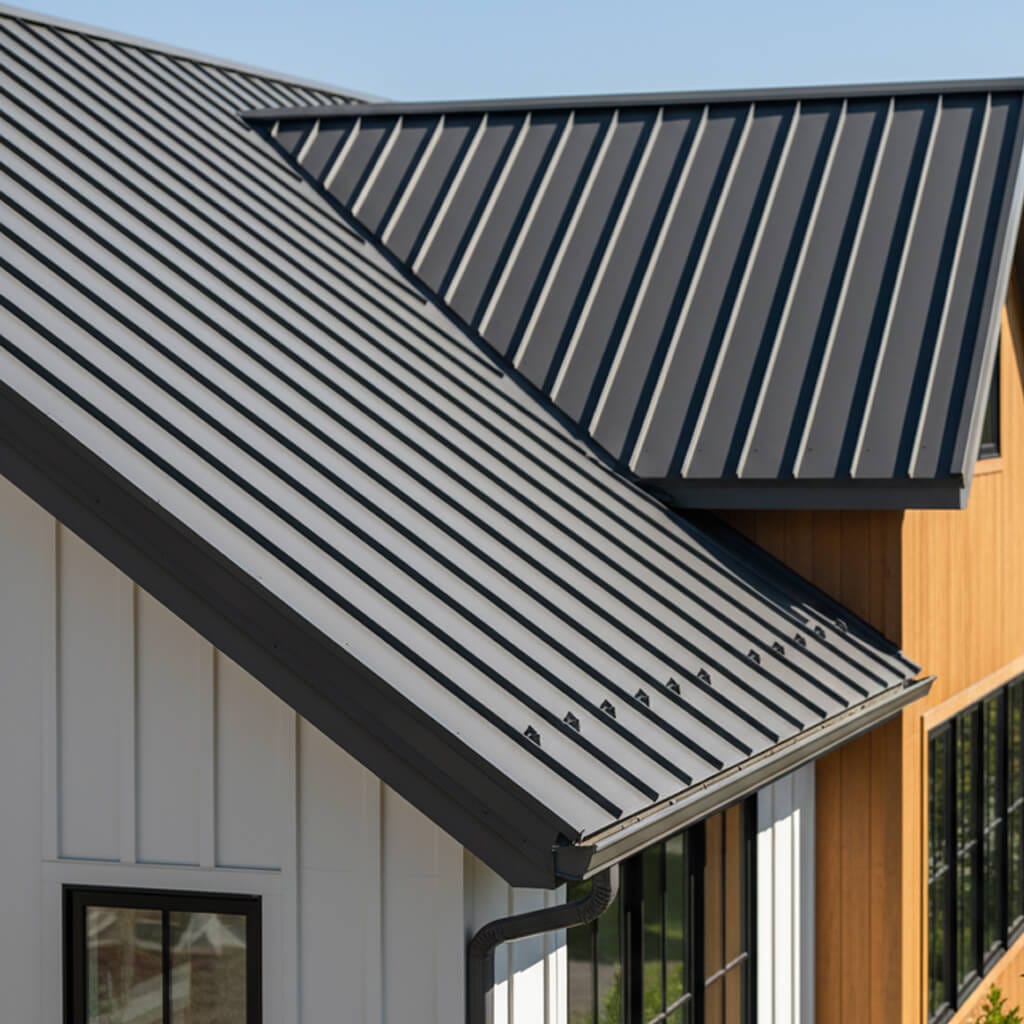
| Material | Cost per sq. ft. (installed) | Small House (1,000–1,500 sq. ft.) | Average-Sized House (2,000–2,500 sq. ft.) | Large House (3,000–5,000 sq. ft.) | Lifespan (years) |
|---|---|---|---|---|---|
| Corrugated Steel | $5 – $12 | $5,000 – $18,000 | $10,000 – $30,000 | $15,000 – $60,000 | 30 – 50+ |
| Premium Standing Seam Metal | $9 – $16 | $9,000 – $24,000 | $18,000 – $40,000 | $27,000 – $80,000 | 30 – 50+ |
| Zinc or Copper | $20 – $30 | $20,000 – $45,000 | $40,000 – $75,000 | $60,000 – $150,000 | 70+ |
Tile roofing – which includes clay, concrete, and similar materials like terracotta – is a popular premium option, especially in warm climates and for Spanish or Mediterranean-style homes. Concrete tiles are usually the most affordable in this category, at roughly $7 – $19 per square foot installed, while traditional clay terracotta tiles might run $8 – $25 per square foot .
Tiles are heavy (often 800–1,000+ lbs per square), so the underlying roof structure must be strong; sometimes extra reinforcement is needed, adding to cost. In return, tile roofs offer excellent longevity (often 50 to 100 years with proper maintenance ) and resistance to fire, rot, and insects.
Clay and concrete tiles also have a distinctive, attractive appearance (curved “S” mission tiles or flat slate-like tiles are common profiles). Maintenance involves checking for any cracked or loose tiles, but they generally require little upkeep.
Do note that the weight and brittleness of tiles mean installation and repairs require skilled labor. Stepping on tiles can break them, which is why labor for tile roofing is more expensive and total costs can be high. Still, a tile roof can last a lifetime and adds significant curb appeal and value to a home.
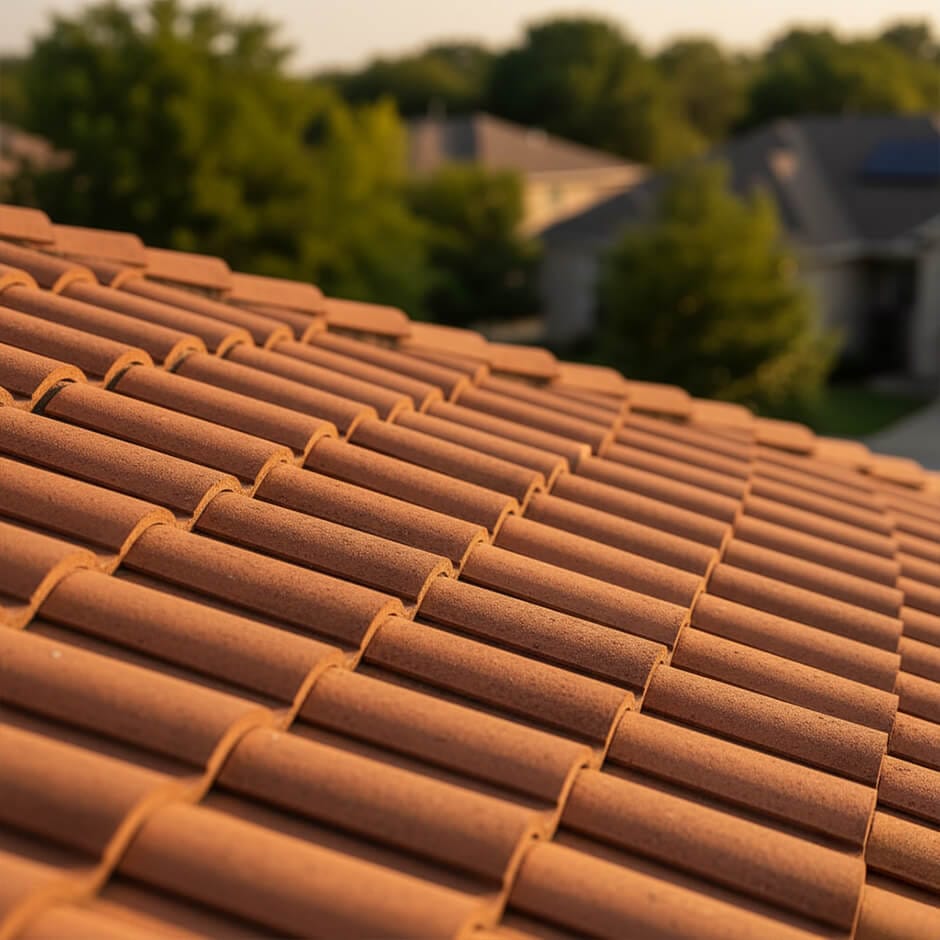
| Material | Cost per sq. ft. (installed) | Small House (1,000–1,500 sq. ft.) | Average-Sized House (2,000–2,500 sq. ft.) | Large House (3,000–5,000 sq. ft.) | Lifespan (years) |
|---|---|---|---|---|---|
| Concrete Tiles | $7 – $19 | $7,000 – $28,500 | $14,000 – $47,500 | $21,000 – $95,000 | 50 – 100 |
| Clay Terracotta Tiles | $8 – $25 | $8,000 – $37,500 | $16,000 – $62,500 | $24,000 – $125,000 | 50 – 100 |
Slate roofing is one of the most durable and longest-lasting options available – a natural slate roof can last 50 to 200 years if well maintained. Slate is a type of stone (thin sheets of rock like shale) that is extremely heavy and expensive. Installing a natural slate tile roof costs roughly $10 – $30 per square foot . The material alone can cost hundreds of dollars per square (100 sq ft) because splitting and quarrying slate is laborious.
There are also synthetic slate products (made from rubber, plastic, or composite materials) which provide a similar look at lower weight; synthetic slate roofs typically cost around $9 – $12 per square foot installed, or about half the price of real slate in total .
Genuine slate roofs are valued for their elegant appearance (often seen on historic or high-end properties) and their unparalleled longevity: they might outlast the building itself. They are completely fireproof and very low maintenance, as individual broken slates can be replaced, and they’re not affected by rot or insects.
The downsides: slate is very heavy (a slate roof can weigh 800–1,500 lbs per square), so the roof structure must be able to support it (sometimes requiring structural reinforcement when retrofitting slate onto a house that originally had lighter shingles). Installation also requires specialized skilled slate roofers; the tiles must be hand-nailed and carefully fitted, which is costly labor.
For homeowners seeking the prestige and permanence of slate without the extreme weight or cost, synthetic slate is an appealing alternative. The synthetic option offers improved impact resistance and lighter weight, though it generally doesn’t last as long as true stone. Whether natural or synthetic, a slate roof represents a major investment upfront, but it yields a truly timeless roof that can add significant value and beauty to a home.
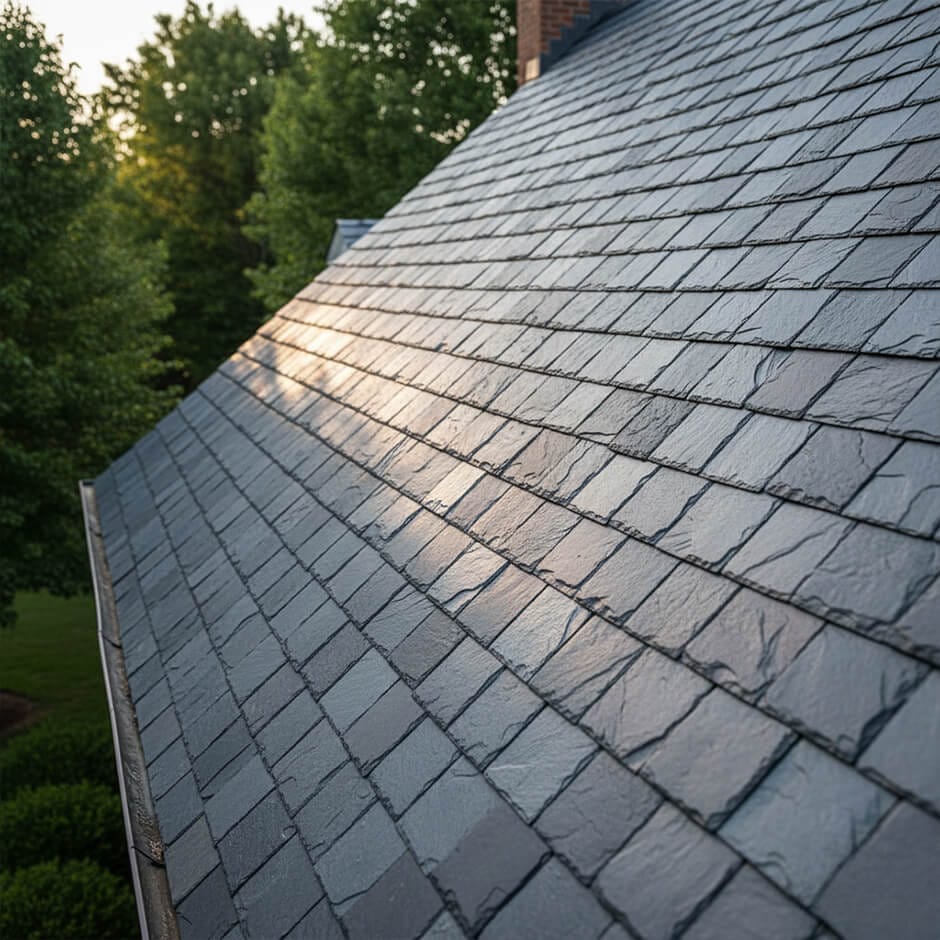
| Material | Cost per sq. ft. (installed) | Small House (1,000–1,500 sq. ft.) | Average-Sized House (2,000–2,500 sq. ft.) | Large House (3,000–5,000 sq. ft.) | Lifespan (years) |
|---|---|---|---|---|---|
| Natural Slate | $10 – $30 | $10,000 – $45,000 | $20,000 – $75,000 | $30,000 – $150,000 | 50 – 200 |
| Synthetic Slate | $9 – $12 | $9,000 – $18,000 | $18,000 – $30,000 | $27,000 – $60,000 | 50 – 200 |
Several key factors influence the total cost of a roof replacement. Understanding these can help you estimate your project cost and identify where you might adjust choices to fit your budget.
The larger the roof, the more material and labor required. Complex roof designs (such as multiple gables, valleys, dormers, chimneys, or multiple stories), involve extra labor and skill, which increases costs. For example, a simple single-story ranch roof will generally cost less than an equally sized roof with intersecting sections or many penetrations (skylights, vents, etc.).
Steep roofs (pitch above 6:12) are more challenging and dangerous to work on. Roofing crews must take extra safety precautions and work more slowly on steep slopes, so steeper roofs incur higher labor costs . A low-slope or flat roof of the same area will typically cost less in labor than a very steep A-frame roof.
Most residential roof replacements involve pitched roofs, but if you have a flat or low-slope roof (common on portions of modern homes, porches, or on some home additions and garages), the cost is usually calculated differently. Flat roofing is typically done with membranes (rubber, PVC, TPO) or built-up roofing (layers of tar and gravel or modified bitumen). Flat roof replacement costs around $3 – $11 per square foot on average, or roughly $4,000 – $16,800 for a 1,500–2,000 sq. ft. roof area . Overall, flat roof replacements tend to be cheaper than pitched roof replacements in terms of total cost, but may need to be redone more frequently. It’s recommended to do a complete tear-off on a flat roof if the old material is failing; adding new layers over old can trap moisture and is usually not advisable.
If your new roof is installed after tearing off the old roofing, it will cost more than a roof-over (overlay) that installs new shingles over the old layer. Tearing off old materials typically adds $1 to $5 per square foot in labor and disposal fees, but it is often necessary for longevity. (Most building codes allow a maximum of two layers of roofing; a third layer usually isn’t permitted.) An overlay can save on removal costs but may shorten the new roof’s lifespan and add weight, so it’s generally only done when the existing roof is in decent shape.
Roofing is labor-intensive – labor makes up roughly 50% to 60% of the total replacement cost. Roofing labor rates vary by region and even season. High-cost metropolitan areas or regions with labor shortages will have higher prices.
If the old roof (shingles or other material) must be removed, there will be costs for demolition and disposal. Heavier materials like tile or slate cost more to remove (on the order of $2–$5 per sq ft) than lighter asphalt shingles (~$1–$3 per sq ft). Dumpsters or hauling fees are often included but can add a few hundred dollars to the project . Multiple layers of old roofing increase the tear-off cost as well.
A roof replacement typically includes new underlayment (moisture barrier) at about $0.10–$0.80 per sq ft, plus new flashing (metal sealing strips around chimneys, vents, valleys) which may cost a few hundred dollars. If your roof has skylights or dormers, those may need new flashing or special attention (adding labor). Replacing soffits, fascia, or gutters at the same time will add cost; for instance, new gutters might add $5–$15 per linear foot. If the roof’s decking (sheathing) is water-damaged or rotten in spots, those plywood sections must be replaced (~$2–$5 per sq ft). In some cases, additional trusses or rafters must be added or repaired (especially if upgrading to a much heavier material), which can cost $5–$14 per sq ft for new trusses. All these potential add-ons will be itemized in our estimate.
Most localities require a building permit for a roof replacement. Permit fees typically run $100 to $500 depending on your location. Additionally, a professional roof inspection (before or after installation) might cost about $100–$400, although many contractors offer initial inspections or estimates for free.
At Holda Construction Roofing & Siding, we believe homeowners deserve both options and clarity—which is why we offer free estimates for quick assessments and paid inspections when a deeper evaluation is needed. Our free estimates are perfect for minor concerns or early-stage budgeting: you send us a description, photos, or video of the issue, and we respond promptly with a rough cost and next-step recommendations. For more serious concerns—like post-storm damage, real estate transactions, or suspected leaks—we recommend our comprehensive paid inspection. This includes a full exterior and attic evaluation, drone and satellite imaging when needed, and moisture or structural checks that most quick looks miss.
We document everything through high-resolution photos and a private video walkthrough, outlining what we find and offering clear repair or replacement options tailored to your needs and budget. You’ll get a detailed, visual report—often the same day—and the inspection fee is typically credited toward your project if you move forward with us. This process not only gives you insight and control, but also lets you experience how we work before making a major investment. Our goal is to equip you with honest information, not pushy sales—so you can make confident, informed decisions about your home.
For more information on our inspections, visit our article Free vs. Paid Roof Inspections: What Homeowners Need to Know.
Roofing during off-season or in extreme weather conditions might affect cost. For example, if a roof must be replaced in winter or during a rainy season, contractors may charge a bit more due to the difficulty and risk. In storm-prone areas, demand after a major storm can also spike prices temporarily. (It’s wise to plan a roof replacement during mild weather if possible, for both cost and quality reasons.)
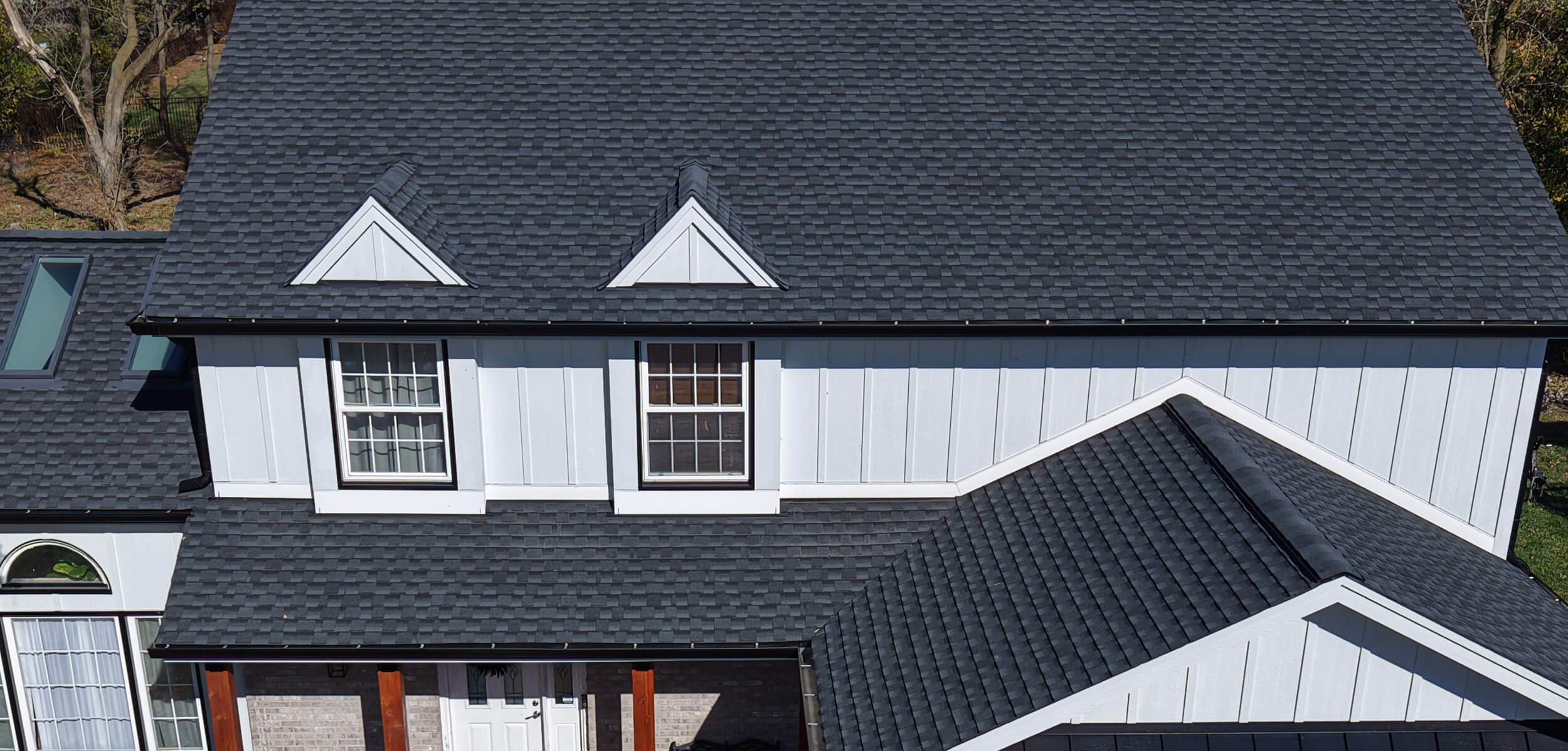
It’s useful to know how a roof replacement quote is typically allocated between materials and labor. In general, materials account for roughly 40% of the total cost, and labor about 60%, though this can vary.
For example, a $10,000 roof estimate might consist of ~$4,000 in shingles, underlayment, nails, vents, etc., and ~$6,000 in labor for the crew. Standard asphalt shingles might cost around $100–$150 per square for materials, whereas high-end materials like slate or metal could be $400–$1,000+ per square just for materials. Labor for installing basic shingles is roughly $150–$300 per square (i.e. $1.50–$3.00 per square foot) in most regions. Labor rates climb significantly for harder-to-install materials: it can run $4–$10+ per square foot for labor on specialty roofs like clay tile or slate (due to the slower installation and expertise required).
Beyond materials and installer wages, your roofing quote may include other line items. Common components are old roof removal (often charged at $100–$300 per square for tear-off and disposal, unless it’s an overlay), dump fees, new flashing and vents, and permit fees. Always ask for a detailed breakdown when you receive a roofing estimate – a reputable contractor will specify the costs for removal, materials, labor, and any added work (like replacing plywood decking or installing new gutters). Understanding this breakdown can help you compare bids or decide where you might choose a less expensive material to save money.
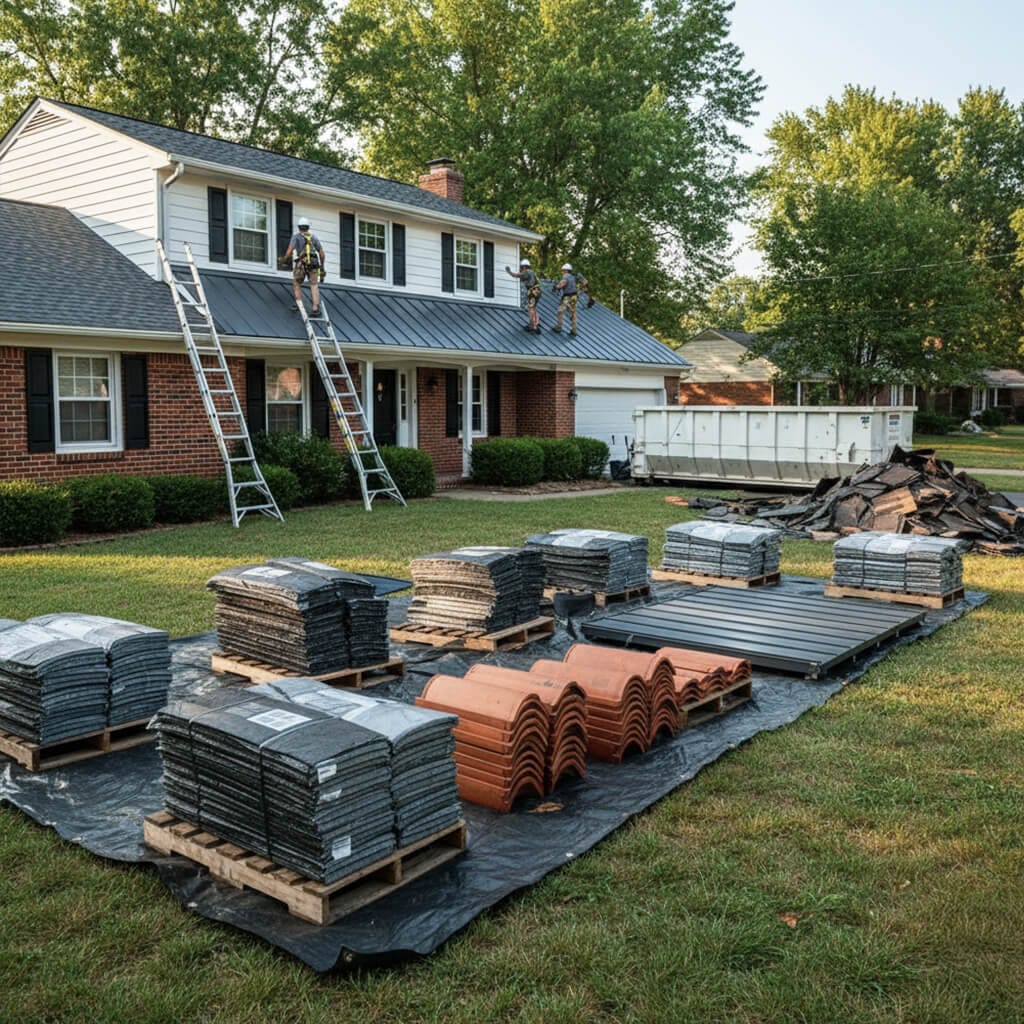
Replacing or repairing a roof is a major decision: one that affects not only your home’s appearance and energy efficiency, but also its long-term value and protection. As you’ve seen, roofing costs can vary widely based on materials, complexity, and other factors, but with the right information and a trusted partner, you can navigate this process confidently.
At Holda Construction Roofing & Siding, our goal is to educate and empower homeowners with transparent pricing, detailed assessments, and personalized solutions. Whether you need a quick estimate, a full professional inspection, or help choosing the right materials for your budget, we’re here to guide you every step of the way. No pressure, no guesswork—just honest recommendations from a team that treats your home like our own.
Ready to get started? Contact us today for a free estimate or to schedule your detailed roof inspection. Let’s protect what matters most—your home, your investment, and your peace of mind.
Investing in your roof is investing in the safety, comfort, and value of your home. By planning ahead and budgeting appropriately, you can ensure your home remains protected and looking its best for years to come.
5 / 5
For a FREE quote, to schedule an inspection, or simply to have your questions answered, complete the form below. We’re happy to help!
With over twenty years in business and hundreds of satisfied customers, we know what it takes to properly maintain a home. Join the family of satisfied homeowners who trust Holda Construction Roofing and Siding for all their roofing and siding needs.
We look forward to working with you!
Address
317 W Colfax St. Suite 102
Palatine, IL 60067